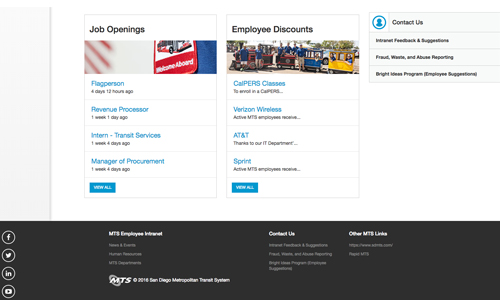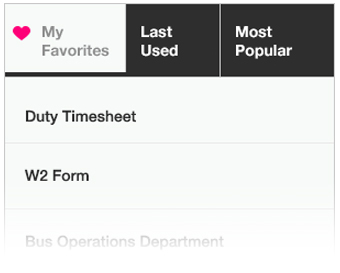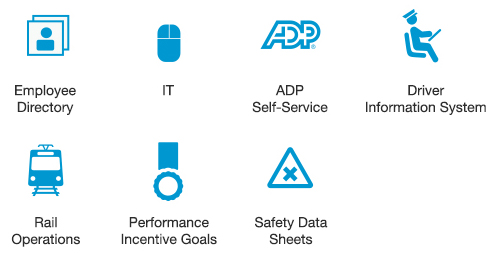You are here
Improving Access with Medical Transportation Management
MTM and MTS Access have successfully teamed up to improve the Access screening process (from L to R): MTM Project Manager Callie Johnson, MTS Transit Operations Specialist Vassilena Lerinska, MTM Administrative Assistant Bryttney Salvant, MTM Mobility Assessment Evaluator Caroline Margulis, MTM Mobility Assessment Evaluator Heriberto Gaytan, and MTS Manager of Paratransit and Minibus Jay Washburn; MTS Access buses lined up at the Copley Park Division in Kearny Mesa. Out of a fleet of approximately 800 buses, 169 are MTS Access buses.
Contract Services Profile: MTS Access (Part 1 of 2)
MTS has a clear mandate to provide transit service for riders who are unable to access the fixed-route Trolley and bus service due to disabilities. The service is called Access and it provides curb-to-curb and doorto-door appointment-based service for eligible riders.
Access is an important service for thousands of people, but it’s also very expensive for the agency to operate.
For example, the average cost MTS pays per passenger trip on the fixed-route system is $1.50. The cost per passenger trip on MTS Access is approximately $30. This is an extremely high cost that MTS subsidizes. So it’s important to closely watch and manage this service’s ridership and performance.
When MTS Access ridership jumped from 354,000 in FY 2010 to 529,000 in FY 2017 (a 49% increase in ridership), steps were taken to ensure Access was reaching the people who needed the service most.
MTS hired a new Access manager to oversee the program, brought in a new contractor to manage the screening process, and improved the connection between Access and the fixedroute system.
Improving the Screening Process with MTM
In December 2016, MTS hired Medical Transportation Management (MTM) to provide functional eligibility assessments for people interested in MTS Access services.
MTM reviews approximately 3,000 Access applications each year. About 55% of them are new applicants and 45% are renewing applicants.
Five outcomes are possible for applicants – full eligibility, conditional eligibility, temporary, visitor or not eligible. And just because someone uses a wheelchair, doesn’t mean they are eligible. MTS’ fixed route system is built to accommodate people with special needs.
“We want to provide the best services possible for those who meet the Federal Transit Administration’s eligibility requirements,” said Jay Washburn, MTS Manager of Paratransit and Mini Bus. Washburn joined MTS from Chicago in 2016. He manages both the Access screening process and paratransit bus operations. “For those who don’t qualify, or only partly qualify, we make it a priority for them to learn about our fixed-route system or programs like Senior/Disabled/ Medicare discounted fares and Travel Training program.”
To get started, applicants must fill out a Part A application. And a licensed medical professional needs to fill out a Part B section of the application as well.
After the application is submitted, MTM will set up a time for the applicant’s in-person assessment on the second floor at the MTS Bus Imperial Avenue Division.
“The in-person assessment is critical for us,” said Callie Johnson, MTM Manager who has been handling the assessments for MTS since the contract started. Johnson oversees a team of three MTM employees who handle the in-person interviews. “The assessment begins when the applicant walks in the door. We ask about their ride here, get a better understanding of their areas of need, and then the applicant meets with an evaluator to go over the application. Our goal is to ensure everyone gets the best ride for their own situation.”
“We want to provide the best services possible for those who meet the Federal Transit Administration’s eligibility requirements”
- Jay Washburn MTS Manager of Paratransit and Mini Bus
Using the Teaching Moment
Since MTM has taken over the Access screening process, communication with applicants has been a priority. MTM uses the assessment as an opportunity to learn about an applicant’s difficulties and how their conditions affect them – ranging from physical pain to how close they live to a transit center. Based on all this information, a decision is rendered about eligibility.
It’s not just a yes/no determination for Access applicants. MTM also uses this time as a way to educate applicants about the MTS system. For example, some applicants contend they can’t carry a cart onto a bus. MTM will show them how the bus kneels down to curb level for easy boarding.
MTM will even take the applicant on a bus or Trolley trip or walk around the building to better understand the individual’s needs. “Often times there’s a teaching moment about how the transit system works. This is an important learning opportunity we try to provide to applicants,” added Johnson.
Providing Mobility Options
In addition to learning about our fixed-route system, the cost and convenience of using it can provide better options than Access. For example, an S/D/M monthly pass with unlimited rides on MTS buses and Trolleys costs $18. But each Access trip costs $4.50. If multiple trips are taken per week, Access can be costly to the passenger.
There’s also the convenience factor. The fixed-route system opens the door to more destinations for our passengers. MTM understands this aspect, and has begun promoting the fixed-route system through a new travel training program.
“Clients eligible for travel training are identified during the application process,” said Vassilena Lerinska, MTS Transit Operations Specialist.
Travel training is tailored to the individual’s needs. It can include classroom-based curriculum, small group field trips and one-on-one training for individuals who require more support.
“The ultimate goals of travel training are to increase mobility options and safe travel on public transit,” she added.
The improvements made to our Access eligibility process have delivered results. After record high ridership in FY 2017, MTS has stabilized ridership levels since July 2017 to better match what is happening on our fixed-route system. Additionally, the Access eligibility process only has a 2% appeals rate.
MTM has s better eligibility process with a stronger focus on the applicant’s needs, effectively communicating with applicants, and providing good alternatives for passengers to become more familiar with the menu of options our system can provide.
Next Issue: Contract Services: MTS Access (Part 2) Helping Those Who Need it Most

 Employee Directory
Employee Directory IT Help Desk
IT Help Desk ADP Self-Service
ADP Self-Service Driver Information System
Driver Information System Bus Operations
Bus Operations Rail Operations
Rail Operations Performance Incentive Program
Performance Incentive Program Safety Data Sheets
Safety Data Sheets





